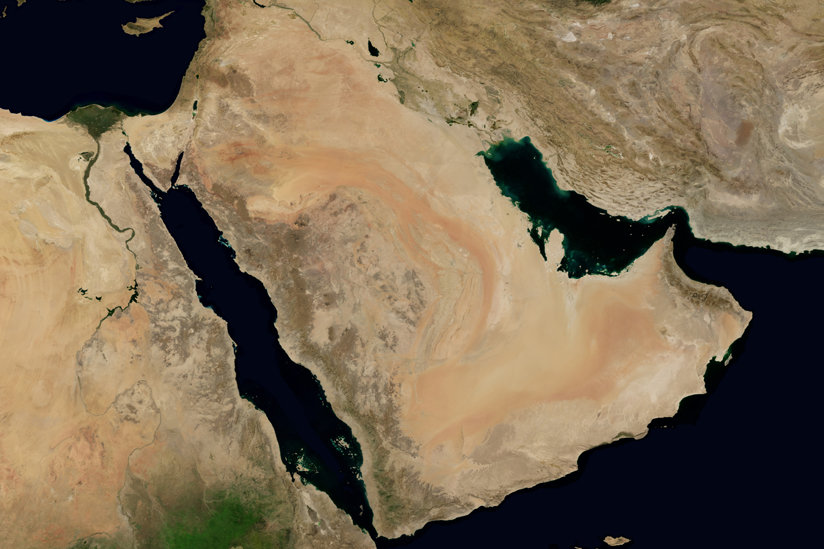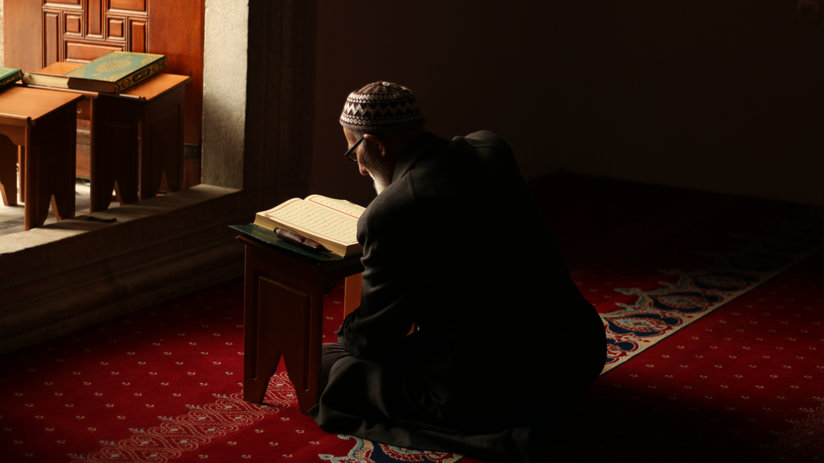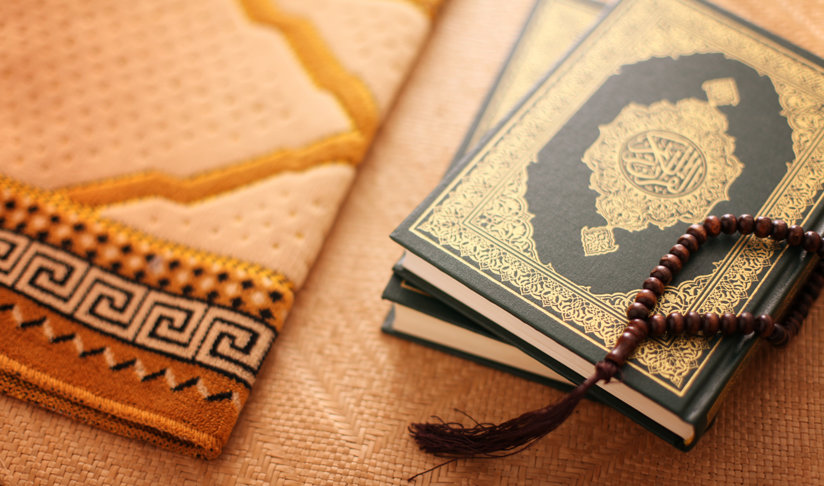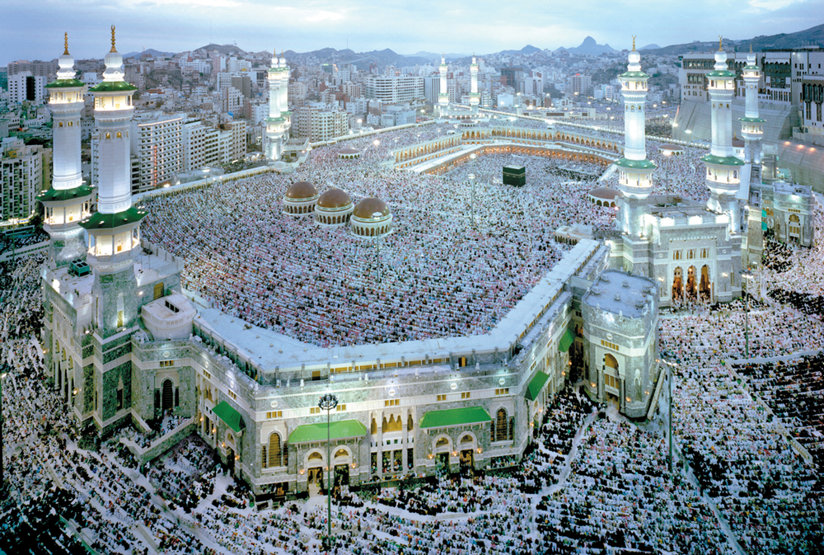By Leland Thoburn
courtesy of the https://www.standleague.org/ Article Link : https://bit.ly/3x2KoPJ
At the dawn of the 6th century CE, humankind was mired in a global barbarism. The dark ages were raging in Europe, and the Arabian Peninsula offered little contrast. The highest political unit was the tribe. Raiders roamed the desert, looking for caravans or other tribes to prey on. Honor through vengeance was the highest ethic a man could aspire to.
In 570 CE, Muhammad was born.

Biblical Roots
In the Bible, Abraham is said to have settled in Canaan (roughly equivalent to Israel today). There, he had two sons. The first, Ishmael, was born of Abraham and a handmaid, Hagar. The second, Isaac, was born of Abraham’s wife Sarah when she was 90 years old. Isaac grew to be the favored son, with Sarah casting Ishmael and Hagar out to wander the desert in search of a new home. Forty camel-ride days south of Canaan, Hagar and Ishmael arrived in a valley called “Becca.” There, dying of thirst, Hagar ran back and forth between two hills seven times (an act ritualistically repeated by pilgrims to the site), while Ishmael cried out to the Lord. As he did, an Angel appeared and showed them a spring. Ishmael and Hagar survived, and of them the Bible relates little further.
Back in Canaan, Isaac became the progenitor of the 12 tribes of Israel (the Jews). Of him, the Bible has much to say, as Isaac became the patriarch of both the Jewish and Christian faiths.
Meanwhile, Ishmael and his mother settled in Becca. When Ishmael was still a young man, his father, Abraham, came to visit him. While there, Abraham dreamed that God commanded him to sacrifice his son. In the Bible, this story concerns Isaac. In Islam, Ishmael is the intended sacrifice. In both cultures, the story ends with God staying Abraham’s hand and providing a sheep to sacrifice instead. The celebration of Ishmael’s salvation is one of the holy days of Islam.
In 570 CE, Muhammad was born.
Abraham’s visit provided another, more important foundation for Islam. While there, God showed Abraham where to build an edifice, next to the well that had saved the life of his son. It was to be called the “Ka’bah,” or “Cube,” which was to be its shape. Its four corners pointed roughly to the four corners of the compass, but its most holy feature was a black stone, known as the celestial stone. Islamic lore relates that the stone descended from paradise whiter than milk, but that the sins of the sons of Adam made it black. An Angel brought the stone to Abraham, who set it in the east wall of the Ka’bah. (Some texts say that the Ka’bah predates humankind, that it was destroyed by the flood, and that Abraham’s effort was reconstruction rather than new construction; others trace the Ka’bah’s origins to Adam and Eve.)
For many centuries, the Ka’bah was revered by many peoples—Arab and Jewish alike—who, regardless of their faith, made regular pilgrimages to the site.
Becca became Makkah (Mecca), and Ishmael’s progeny became the Arabs, and eventually included Muhammad, the Prophet of Islam.
Makkah
The religious and cultural structure of the Arabs mirrored their tribal political structure—fractured, inconsistent, and often in opposition. This plurality manifested itself in the worship of many different gods and their idols, brought to the Ka’bah by pilgrims. The idols represented communication channels to the gods and eventually garnered more attention than the gods themselves. The monotheists were outraged, but the Ka’bah had become a significant economic force in the region, and it was in nobody’s interest to offend the pilgrims. Whoever controlled the site controlled the wealth it generated, so the idols multiplied.
By the 6th century CE, a tribe known as the Quraysh had assumed control of the Ka’bah. In 570, Muhammad was born into the Quraysh, in Makkah.
The Young Prophet
Muhammad spent the first several years of his childhood as a ward of Bedouins. For city-Arabs, this was the custom of the day; Bedouins gave the child its first internship in desert life. The Arab had learned that towns dulled a man, both physically and spiritually. In an era of high infant mortality rates, the fresh air of the desert guarded against frequent and fatal epidemics, while the Bedouin lifestyle allowed little room for the sloth, slovenliness and sin engendered by cities.
The towns also dulled a man’s speech.
Few Arabs felt the need to learn to read or write, but beauty of speech was considered a transcendent virtue. Every Arab wanted their child to be a poet. The Bedouin spoke a more pure form of Arabic, and the stories that were told around their campfires, often in verse, sparked a love of language unlike any that could be gained in the cities.
Although Muhammad never became a poet, he learned well the art of speaking, a skill which served him for the rest of his life.
The Revelations
In the beginning of the 7th century CE, the Ka’bah was being razed in order to build a bigger, better edifice. Several different tribes participated, but when it came time to re-set the black rock, each tribe wanted the honor. For days, disagreement raged, to the point where alliances were formed and preparations begun for battle. Before blood could be spilled, the oldest man present commanded that the dispute would be arbitrated by the next man who walked through the door. All waited anxiously, until, finally, a man appeared. It was Muhammad. Now in his 35th year, he had earned the nickname Al-Ameen, or “the truthful,” and had grown much respected throughout Makkah and beyond. His appearance brought a sigh of relief to the would-be combatants. Muhammad considered the situation, then laid out a cloth on the ground. On that cloth he placed the black rock. He then invited a representative of each tribe to take a corner of the cloth and lift the rock to its resting place in the new wall, whereupon Muhammad lifted the rock off the blanket and set it in its place. Talk of war dissolved, and the tribes returned to their work.
Soon after this, Muhammad began to feel the need for meditation. As was customary, he retreated to a cave in the hills above Makkah, where he devoted himself to reflection and thought.
One day, the Angel Gabriel appeared and gave Muhammad his first revelation. Muhammad later described his revelations as coming in two forms. “Sometimes it cometh unto me like the reverberations of a bell, and that is the hardest upon me; the reverberations abate when I am aware of their message. And sometimes the angel taketh the form of a man and speaketh unto me, and I am aware of what he saith.”
After his first revelation, he returned home, quivering with awe. Soon, he returned to the cave and experienced yet another revelation.
Muhammad was at first very wary of sharing his experiences. With his wife, however, he shared all. She took Muhammad to her cousin, a knowledgeable Christian, to seek help interpreting his revelations. Upon speaking with Muhammad, the old man said, “Verily, Muhammad is the Prophet of this people.”

A New Religion Takes Form
News of the Prophet began to spread—quietly, secretly, through word of mouth amongst those who could be trusted.
In one of Muhammad’s revelations, the Angel Gabriel showed Muhammad how to wash himself before prayer (called ritual ablution), and the postures and movements of proper prayer; how to stand, sit, incline, and prostrate oneself before God. Gabriel also taught Muhammad to open prayers with Allāhu Akbar, God is Most Great, and to close the prayer with as-Salāmu alaykum, Peace be on you.
Muhammad’s revelations formed the core of practice for this new religion. Believers memorized the verses and repeated them in prayer.
Upon speaking with Muhammad, the old man said, “Verily, Muhammad is the Prophet of this people.”
While a legion of idols and disparate deities swarmed Makkah, Islam (which is Arabic for “submission to the will of God”) taught that there was but one God. This made Muhammad a threat to those who controlled the Ka’bah and who flourished from the pilgrimages of the idolaters. They labeled him a sorcerer, a half-wit, a poet and a madman. They offered to pay a physician who could allegedly cure him of his madness. He was accused of breaking up families. His followers were beaten, imprisoned, and disowned by their families. He was reviled at prayer. He persisted, calling out the worship at the Ka’bah as idolatry. Their income threatened beyond endurance, the leaders of the Quraysh descended on Muhammad, intent on violence. Only his uncle, acting in his defense, saved him.
Meanwhile, the religion grew by word of mouth and persuasion.
Others would buy back the freedom of slaves who converted, helping establish the Islamic tradition of charity. By these and innumerable other forms of dissemination, the religion grew, and as it did, so did the Prophet’s influence.
Muhammad had a tremendous presence, and grace. He was also an adept administrator, general, and leader. By the year 630 CE, all of Arabia had come under his rule and creed.

The Qur’an
Muhammad experienced his revelations over a 23-year period, sharing them (in the form of verses) with his followers. He could not read or write. He would say that the verses were seared upon his heart. However, sometimes he would dictate the verses and they would survive, written on whatever was at hand—a bone, a rock, leather, a leaf. Arabic culture relied on word of mouth. As a result, these scraps were held by their authors, or deposited in urns, baskets, or whatever was nearby. No care was taken to keep them safe, or in order. Instead, many of his followers memorized the verses, and this was enough for the new religion to grow.
But in time, death began to claim those in whose memories the religion was borne, including, in 632 CE, Muhammad himself. The following year, a concerted effort was begun to find all the scraps and shards, and to harvest the knowledge from the minds of those still living. The result was the first full, written version of the Qur’an.
The Qur’an (which means “a reading or discourse”) was originally written with no vowels. As a result, the few transcripts that circulated were given differing interpretations by different readers. In 651, in an attempt to quash these corruptions of meaning, the Qur’an was recompiled so that everyone could be reading from the same source. That revision has passed down through nearly 14 centuries with, as Will Durant has said, “unparalleled purity and reverential care.”
The Qur’an is organized into 114 chapters (“surahs”), each of which is composed of between three and 286 verses (“ayahs”). The chapters appear not necessarily in date order, but generally in order of decreasing length. Each passage has a purpose—reciting a prayer, telling stories of the prophets, stating a doctrine, proclaiming a law, denouncing an enemy, regulating ritual and morals, expounding on industry, trade, and finance, and much more. In Islam, these verses comprise the complete word of God, as delivered through his Prophet, Muhammad.
The Qur’an is written in Arabic, and every Muslim, regardless of nationality or native language, is expected to recite the Qur’an in his or her prayers in Arabic.
Shi’as, Sunnis and Sufis
After Muhammad’s death, the Muslims chose Muhammad’s father-in-law as the first Caliph, or leader. He lived two years. The three Caliphs who followed were each assassinated in office, prompting the Muslim government to lose its focus on Islam, and turn to the authoritarian rule of kings.
Out of this chaos, two factions arose. One felt that succession must stay within the house of Muhammad. These became known as the Shi’as. Another school felt that Muslims should be free to choose their leaders from wherever they should arise. These became the Sunnis.
While the issue was one of leadership, not of orthodoxy, the split remains today. Some Islamic nations have a majority of Shi’as, most are dominated by Sunnis, who comprise 85-90% of all Muslims.
The Sufis are the mystics of Islam. Sufism is not a separate school of thought, but a more intensely spiritual practice of Islam. Its participants shun materialism, and search within for their relationship to God.
Christianity and Islam
The primary declaration of Islamic faith translates as “There is no god but God, and Muhammad is God’s servant and messenger.”
This does not mean that Muslims consider themselves alone in the track of history. Islam accepts previous monotheistic religions, specifically Judaism and Christianity, which Islam refers to as “the people of the book.” Together, the three religions are classified as “Abrahamic” religions, as all three descend from Abraham. The Qur’an refers to the creation of Adam and Eve, saying that they were God’s representatives on Earth. In fact, Adam is considered to be the first in the line of God’s prophets, which includes Abraham, Job, David, Ezekiel, Moses, Jesus and other Biblical figures. Muhammad is viewed as the last and greatest in this line of prophets. The Qur’an states that there will be no further prophets after Muhammad.
The Five Pillars
The foundation of Islam rests on what is commonly referred to as the Five Pillars. These are:
1. The declaration of Faith. “I bear witness that there is no god but God, and I bear witness that Muhammad is God’s Servant and Messenger.” This declaration is recited in daily prayers by all Muslims. It is the most essential element of Islamic faith. The sincere statement of this declaration is all that is required to enter Islam.
2. Daily Prayers. Islam’s required minimum daily prayer schedule consists of:
- Morning prayer
- Noon prayer
- Afternoon prayer
- Evening prayer
- Night prayer
Each prayer session consists of passages from the Qur’an in its original Arabic, and most Muslims can complete their prayers in somewhere between three and five minutes. The prayer ritual includes ablution (cleansing the face and arms, wiping the head, and cleansing the feet) and the physical posture (standing, sitting, kneeling, prostrating, etc.) appropriate to that prayer. No matter where they are in the world, Muslims face the Ka’bah when they pray.
There are many other optional prayers which may be offered at any time.
3. Charity. The third pillar of Islam is Almsgiving, donations to charity and the poor. It is required of those who are “financially stable,” and imposes an obligation of brotherhood with other, less fortunate Muslims. The Qur’an teaches that charitable giving is “most pleasing to God.” Muslims are generally required to distribute 2.5% of their surplus earnings to charity, but they are encouraged to give more. Charity extends beyond money: using one’s strength to the benefit of the weak is considered charitable; employing one’s knowledge in the teaching of those less fortunate is considered charitable; Muhammad said that even a smile is charitable.
4. Fasting. The Islamic calendar is a lunar calendar, and thus is not fully in sync with the Gregorian calendar of Western culture. As a result, the Muslim holy month of Ramadan appears consistently on the Muslim calendar, while shifting about each year on the Gregorian calendar. To Muslims, Ramadan is the month when Muhammad first received his revelations. It is marked by avoiding food, drink and intimate relations during the daytime hours, and immersing oneself spiritually for the entire month.
5. Pilgrimage. Every Muslim who can afford it is required to make a pilgrimage (the “Hajj”) to Makkah at least once in his or her lifetime. It is an act of community with the two to three million other Muslims who make the pilgrimage each year. It is also a time for devotion to God and God’s message. While in Makkah, the pilgrim visits the Ka’bah and other holy sites. Malcolm X credited his pilgrimage with softening his views on violent confrontation and leading him to greater acceptance of others.

Islamic Holy Days
The Arabic word for festival is “Eid.” Islamic holy days are referred to as Eids, but it is also said that any day spent worshiping God is an Eid.
The two primary holy days of Islam are:
- Eid-al-Adha, the festival of sacrifice. In 2021, this three-day holiday begins in most countries on July 20. This holiday celebrates God’s intervention with Abraham that saved the life of Ishmael.
- Eid-al-Fitr, the end of Ramadan, the Muslim month of fasting. This three-day celebration began in 2021 in most countries on May 13.
Other significant dates on the Islamic calendar include:
- Ramadan, the Muslim holy month, beginning in 2021 on April 13, and ending with Eid-al-Fitr.
- Mawlid, the celebration of the birth of the Prophet (though it is not universally practiced in all areas of Islam). In 2021, this celebration will be held from October 18-19.
- Al-Hijra is the Islamic New Year, which in 2021 will be held starting on August 9.
Death, and the Day of Reckoning
Islam holds that people are born pure and without sin, but that in life they fall prey to sin and temptation, and they forget their duty to God. One of the prime characteristics of humankind is to forget. Death is but a stage in the soul’s migration to the hereafter. After death, all souls reside in an intermediate world where they will experience comfort or punishment, based on their lives on Earth.
Eventually, there comes the Day of Judgment. On that day, all souls are called to account before God. Those who have repented their sins and expressed fealty to God will be saved and spend eternity in paradise, though a stint in hell may be called for, depending on the severity of the sins. Those whose sins exceed their goodness, and who have not repented, will spend eternity in hell.
Opportunity for redemption abounds. God is merciful and kind, and redemption from one’s sins is possible if one but surrenders to God. Indeed, the definition of Muslim is “the one who surrenders.”
Islamic Culture
Islamic culture is rich and complex. Owing to the influence of Islam, the Middle East experienced a renaissance many centuries before Europe. The Islamic “golden age” (8th century to 14th century CE) contributed much in the way of music, poetry, literature, agriculture, and science to humankind.
Today, some elements of Islamic culture include:
- The family is held in the highest regard. “Marriage is half of your religion,” Muhammad reportedly said, and there are many Islamic teachings urging care and respect for one’s parents.
- Work is considered a spiritual endeavor, and gaining wealth through honest labor and permissible means is virtuous, providing that one spends permissibly and gives aid to the poor. Islamic law forbids usurious interest.
- Food and drink are a valued link between body and spirit. Certain meats, such as pork and predatory animals (sharks, tigers, etc.), are prohibited. Approved meats (which include beef, chicken, and many fishes) must be prepared according to law. Alcohol and illicit drugs are forbidden.
- The body is sacred. Islam seeks to discourage sexual objectification and lust by emphasizing modesty in dress and public behavior.
Islam in Today’s World
Because of their common ancestry, the three Abrahamic religions share a deeper bond than many acknowledge. Islam’s earliest conflicts were with the idolaters. On this issue, the other monotheistic religions of the day—Judaism and Christianity—were its allies. All worship the same single God, all recognize the presence of the same Angels as representatives of that God, and all acknowledge a common Biblical history spanning from Adam through Abraham.
Today, Islam is the second largest religion on Earth. Every day, roughly 1.8 billion people, or 24% of the earth’s population, pray in the direction of Makkah, to the same Ka’bah that was built by Abraham 3,000 years ago.
